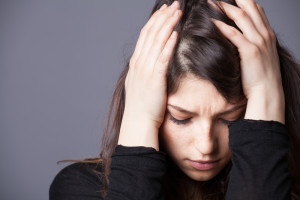Everyone feels stressed and anxious from time to time. But having a level of anxiety that’s so intense that it impacts your daily life means you may have an anxiety disorder.
Millions of people suffer from some form of anxiety. There are various types of anxiety disorders, such as society anxiety, generalized anxiety, and phobias.
If you suffer from anxiety, it’s important to know the signs of a disorder, so you can get the help you need to live happily and healthy. While anxiety affects everyone differently, Stuart MacFarlane, a Jungian Analyst, explains some common signs to look out for.
You feel tense in social situations
Most people can agree they feel nervous before a presentation or when asking their crush out on a date. But people with social anxiety disorder feel intense fear in non-threatening social or performance situations. They may fear being judged or embarrassing themselves in front of others. Along with their fear and worry, they can experience physical symptoms, such as trembling, nausea, headaches, dizziness, racing heart, and feeling out-of-control.
You worry constantly
Everyone worries. But what’s considered too much worrying? Those with generalized anxiety disorder constantly worry about everyday things, no matter how minor or unlikely they are. The anxiety is persistent and interferes with their daily life. Like other anxiety disorders, social anxiety can be accompanied by physical symptoms, such as stomach aches and fatigue.
Your fears are irrational
Do you have an irrational fear that cripples you? Maybe you’re afraid of flying, small spaces, or crowds. Your fear is so intense that it becomes overwhelming and is perceived as a much bigger threat than it should be. If this is the case, then you could have a phobia disorder.
You suffer from chronic indigestion
As previously described, anxiety symptoms aren’t just mental. Anxiety can present itself physically too. If you’ve been suffering from chronic indigestion, including frequent cramping, stomach aches, bloating, and gas, then this could be a symptom of anxiety. Keep in mind that not all gut problems are caused by anxiety. But they often can be, as your gut is sensitive to psychological factors,
If you suffer from anxiety, then talk to a mental health professional. Your doctor will be able to diagnose your anxiety disorder and help you overcome it.

 Autumn is in full swing and that means cooler temps, falling leaves and shorter days are upon us. As the season begins to progress and we see even more changes, some of us may begin to feel the ‘blues’ because we are spending less time outdoors, which means we aren’t soaking in as much vitamin D from the sun and that can affect us in a few different ways. Our emotions may change but when it gets to the point where we are feeling depressed it could be due to Seasonal Affective Disorder.
Autumn is in full swing and that means cooler temps, falling leaves and shorter days are upon us. As the season begins to progress and we see even more changes, some of us may begin to feel the ‘blues’ because we are spending less time outdoors, which means we aren’t soaking in as much vitamin D from the sun and that can affect us in a few different ways. Our emotions may change but when it gets to the point where we are feeling depressed it could be due to Seasonal Affective Disorder.